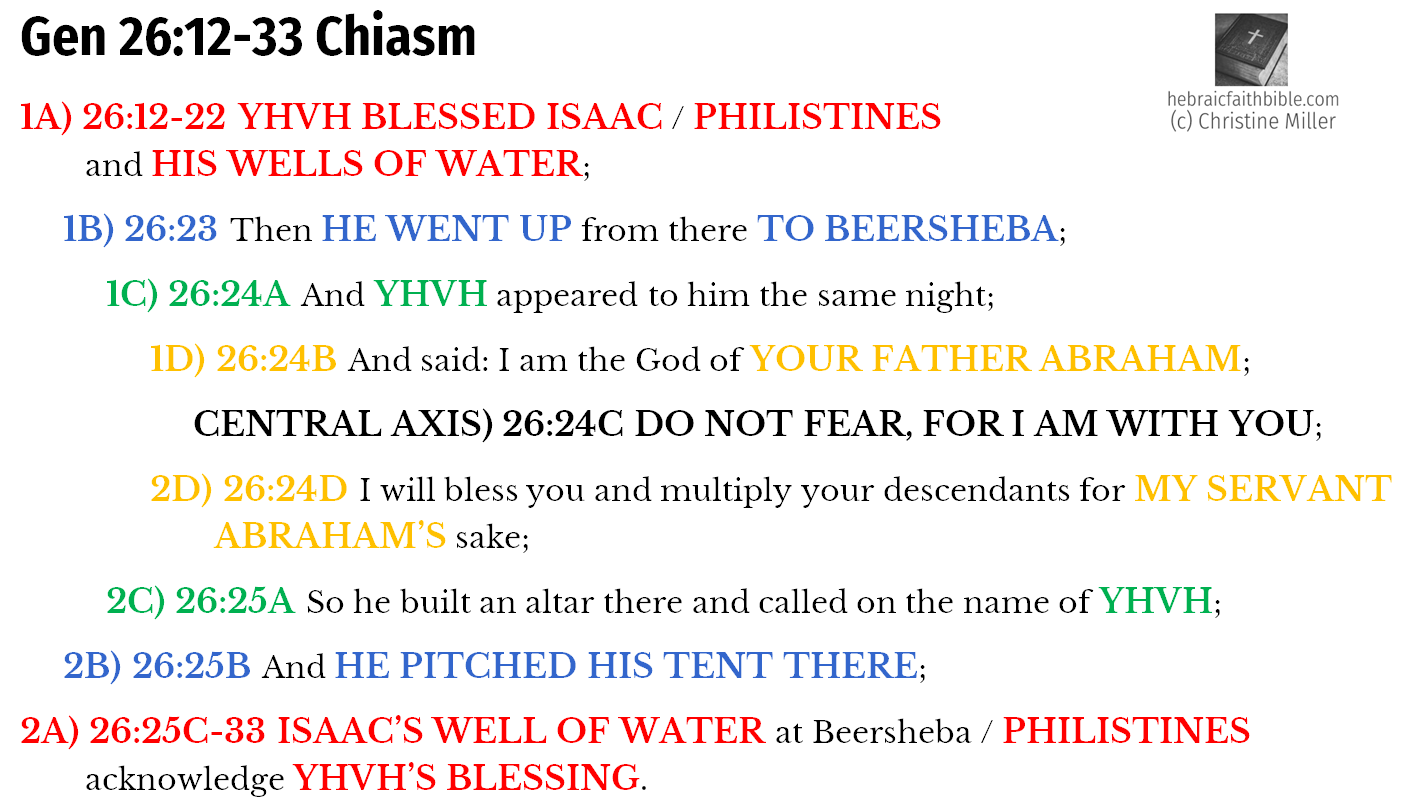Read Genesis 26:12-35 at Bible Gateway.
The teaching tools of scripture
Gen 1:1-2:3 and the teaching tools of scripture part one and part two
Gen 1:1-6:8 and finding the topic themes of scripture
Hebrew paragraph divisions
26:1-33 {s} Contention over Isaac’s wife, and wells of water (life of Isaac repeats events from the life of Abraham)
26:34-35 {s} Esau’s wives
Strong themes of the parashah
None this week.
Gen 26:12-33 chiastic structure
Download the fully expanded Gen 26:12-33 Triennial Vayizra Yitschak chiasm pdf (Coming …).
The final paragraph of the parashah, Gen 26:34-35, is a loose end and does not go with this parashah’s structure that I could see. But that it was a loose end, helped me to see a repeating pattern from Gen 26:1-35 {s+s}:
1.1) 26:1a, The famine;
1.2) 26:1b, Abimelech + the Philistines;
1.3) 26:2-5. YHVH appeared to him: I will bless you;
1.4) 26:6, Isaac dwelt in Gerar;
1.5) 26:7-11, Contention over Isaac’s wife;
2.1) 26:12-14, The famine reversed for Isaac;
2.2) 26:15-22, Abimelech + the Philistines + Isaac’s wells of water;
2.3) 26:23-25a, YHVH appeared to him: I will bless you;
2.4) 26:25b-33, Isaac dwelt in Beersheba;
2.5) 26:34-35, Contention over Esau’s wives.
Theme of the parashah
Difficult circumstances and contentions, but YHVH brought Isaac through them and was with him.
Finding Messiah in Vayizra Yitschak
26:1-33 {s} Contention over Isaac’s wife, and wells of water (the life of Isaac repeats events from the life of Abraham)
26:34-35 {s} Esau’s wives
The life of Isaac repeats events from the life of Abraham in the Philistine’s contentions, and reversal to sue for peace. But Isaac also repeats Abraham’s character trait of relinquishing rights. Abraham’s wells, and the wells that Isaac’s servants dug, were his by right, but when the Philistines contended with him over them, he did not assert his rights but moved on. This is also Abraham’s character trait. The land was his by right, but when Lot’s herdsmen quarreled with him over it, Abraham gave Lot first choice. He relinquished his right, and, just as in Isaac’s case, God immediately came to him and reaffirmed the covenant with him. The character trait of relinquishing rights is a character trait of Messiah Yeshua.
Let this mind be in you, which was also in Messiah Yeshua, who, being in the form of God, thought it not robbery to be equal with God, but made Himself of no reputation, and took upon Him the form of a servant, and was made in the likeness of men. And being found in fashion as a man, He humbled Himself, and became obedient unto death, even the death of the cross. Phi 2:5-8
Additional readings for this parashah
Psa 21 (my notes) | Isa 62 (my notes) | Luk 16 (my notes)
Studies in triennial Vayizra Yitschak
Gen 26, Bible for Beginners
Gen 26:1-33, Chiastic structure
Gen 26, And the chiastic structure of the patriarchs
Gen 26:12-33, Chiastic structure
Gen 26:18-22, The patriarchs and relinquishing rights
Further study off site
The Genesis Philistines – Associates for Biblical Research


















Leave a Reply